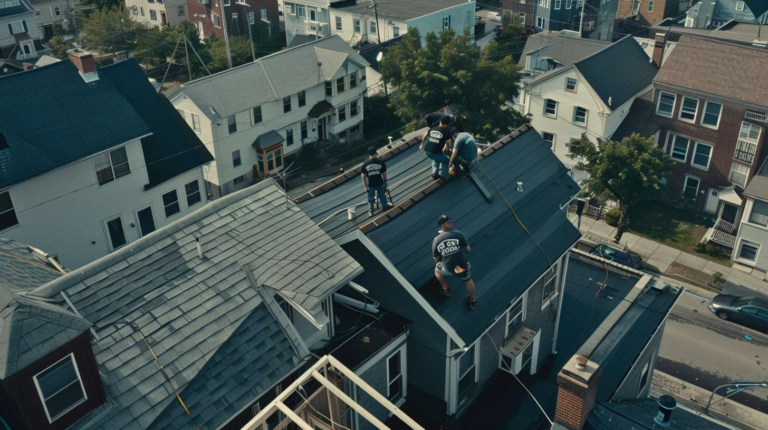How to Cool Down a Flat Roof House: Expert Solutions That Work
Look, I've been working flat roofs in Queens for over 20 years, and let me tell you - if you're sitting in your house on a 90-degree July day wondering how to cool down a flat roof house, you're not alone. The flat roof above your head can turn into a massive heat collector, pushing your AC bills through the roof and making your top floor feel like an oven.
Here's the thing about flat roofs - they're not really flat. They should have a slight slope for drainage, but that minimal pitch means they collect and hold heat like nobody's business. I see this problem every summer from Astoria to Jamaica, and there are proven solutions that actually work.
Why Flat Roof Houses Get So Hot
Before we dive into solutions, you need to understand what's happening up there. Your flat roof is basically a horizontal surface that gets pounded by direct sunlight all day long. Unlike pitched roofs that shed heat as it rises, flat roofs trap that thermal energy. The membrane - whether it's EPDM, TPO, or modified bitumen - absorbs heat and radiates it down into your living space.
And here in Queens? We get that humid summer heat that just sits there. The salt air from the East River doesn't help either - it can break down reflective coatings faster than you'd think.
Reflective Roof Coatings: Your First Line of Defense
The fastest way to keep a flat roof house cool is with a quality reflective coating. We use Gaco Western or similar high-grade elastomeric coatings that reflect 80-90% of UV rays instead of absorbing them.
Cost runs about $2-4 per square foot installed, depending on the prep work needed. Last month we did a 1,200 square foot flat roof in Elmhurst - total cost was $3,800 including surface prep and two coats. The homeowner called me three weeks later saying their second floor was 8-10 degrees cooler.
But here's what most contractors won't tell you - the surface prep is everything. You can't just slap coating over a dirty, cracked roof and expect it to work. We pressure wash, repair any membrane damage, prime if needed, then apply the coating. Skip the prep and you're wasting your money.
Proper Insulation Makes All the Difference
I can't tell you how many flat roof houses I've seen with inadequate insulation. The building codes have changed over the years, and what was acceptable in 1985 won't cut it today.
Most flat roofs need R-30 minimum insulation value. If you've got an older house with just a few inches of fiberglass batts up there, you're basically living under a heat lamp. Adding rigid foam insulation above the roof deck is the gold standard - it creates a thermal barrier and eliminates thermal bridging.
Polyiso boards are what we typically use - 3-4 inches gives you that R-30 value. Installation runs $8-12 per square foot, but the energy savings are real. One customer in Flushing saw their summer electric bill drop by $180 per month after we upgraded their roof insulation.
Ventilation Solutions That Actually Work
Now, ventilation on flat roofs is tricky. You can't just throw some ridge vents up there like on a pitched roof. But there are solutions.
Powered exhaust fans work well if you've got attic space. We install them near the high points of the roof (remember, even flat roofs have slight slopes). Solar-powered units are popular - no electrical work needed and they run when you need them most.
For houses without attic space, we sometimes create ventilated air gaps above the insulation. It's more complex, but it works. Think of it as creating a buffer zone between the hot roof surface and your living space.
Green Roof Systems: The Premium Solution
Okay, this isn't for everyone, but if you're looking at how to cool down a flat roof house and budget isn't your main concern, extensive green roof systems are incredibly effective.
We're talking about 3-4 inches of growing medium with drought-resistant plants like sedum. The plants provide natural cooling through evapotranspiration, and the growing medium insulates your roof. Installation costs $15-25 per square foot, but the cooling effect is dramatic.
I did one in Long Island City two years ago - 800 square foot roof, total cost around $18,000. The homeowner says their top floor stays comfortable even on the hottest days, and their roof membrane will probably last twice as long because it's protected from UV and temperature swings.
Roof Color and Material Choices
If you're replacing your flat roof membrane anyway, color matters more than you think. Black EPDM is still common, but it's basically a heat magnet. White TPO or light-colored modified bitumen will keep your roof 30-40 degrees cooler on a sunny day.
TPO in white runs about the same cost as EPDM - $8-12 per square foot installed - but the cooling benefit is immediate. We just finished a job on 37th Avenue in Jackson Heights where we replaced black EPDM with white TPO, and the homeowner noticed the difference the first hot day.
Air Sealing: The Overlooked Solution
Here's something most people miss - air leaks. If hot air is getting into your house through gaps around the roof perimeter, vent penetrations, or where walls meet the roof, you're fighting a losing battle.
We use spray foam or quality caulking to seal these areas. It's not glamorous work, but it makes a huge difference. A properly sealed flat roof house stays cooler and your AC doesn't have to work overtime.
When to Call the Professionals
Look, some of this stuff you can DIY - applying reflective coating isn't rocket science if your roof is in good shape. But structural work, major insulation upgrades, or anything involving the roof membrane should be left to licensed contractors.
At Flat Masters NY, we see too many DIY jobs gone wrong. Water damage from improper flashing work can cost you thousands more than hiring a pro from the start. Plus, most manufacturer warranties require professional installation.
So what's really the best approach? Start with what makes the most financial sense. Reflective coating gives you immediate results for reasonable cost. If you're planning a roof replacement anyway, upgrade to white membrane and add insulation while you're at it.
The key is understanding that keeping a flat roof house cool isn't just one solution - it's usually a combination approach. Reflective surfaces to reject heat, insulation to block what does get through, and ventilation to remove trapped hot air.
Every house is different, and what works in Bayside might need tweaking in Woodhaven because of microclimates, building age, and existing conditions. That's why we always do a thorough assessment before recommending solutions.
If you're dealing with a hot flat roof house this summer, don't suffer through another season. Give us a call at Flat Masters NY - we've solved this problem hundreds of times across Queens, and we can help you figure out the most cost-effective approach for your specific situation.


